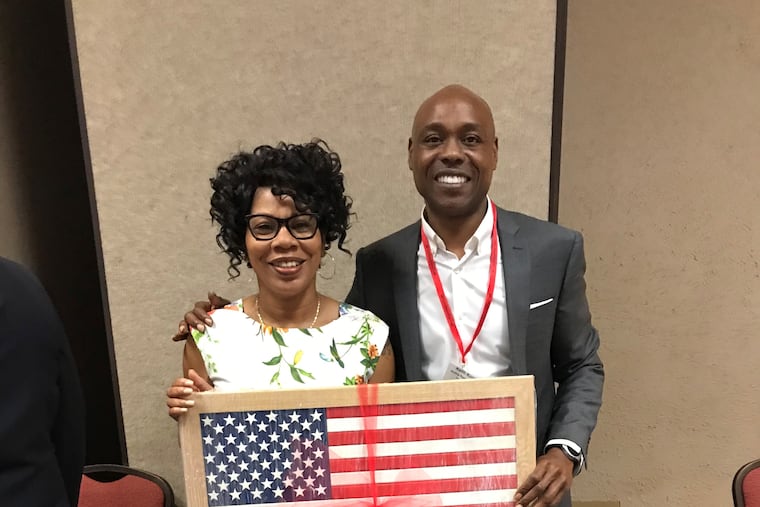By restricting PPP based on criminal record, many nonprofits will suffer | Opinion
As leaders of nonprofit organizations that are dedicated to supporting second chances for people who have been in the criminal justice system, we call on the U.S. Small Business Administration to adjust its application requirements.

Small-business owners and leaders of nonprofit organizations in Pennsylvania are struggling to make payroll and keep their doors open amid the pandemic. So many of them jumped at the opportunity for financial relief when President Donald Trump signed a $2.2 trillion stimulus bill into law on March 19.
But upon applying for access to the $350 billion of assistance the legislation provides, some are learning they’ll be excluded. And it’s not just business; it’s personal.
Consideration of an applicant’s criminal record is front and center of the U.S. Small Business Administration’s application forms for COVID-19 relief. On the Paycheck Protection Program’s application, for example, questions five and six serve to disqualify a person who was convicted of a felony within the last five years from receiving a federal loan to help pay their workers — no matter the nature of the crime, the circumstances of the offense, or the sincerity of their rehabilitation.
The program also disqualifies someone who was placed on parole for a felony within the last five years, which means it applies even to people who have served all of their time in prison and a potentially significant period of post-prison community supervision. In fact, if in the last five years a person has merely been accused of a felony, and then participated in a pretrial diversion program to resolve the accusation, they could be denied desperately needed financial support.
As leaders of nonprofit organizations that are dedicated to supporting second chances for people who have been in the criminal justice system, these questions stung. We share the belief that the empathy stemming from experience of the justice system leads to some of the best work that is done in our field. Many people who have been in prison or jail choose to found organizations that give back to their communities once they’re out. To refuse them assistance on the basis of past mistakes — particularly when those very mistakes are the fuel that fires their ambition to help others — is to withhold our collective support from some of the people who need and merit it the most.
These application questions don’t just affect nonprofits; they also bar relief to owners of restaurants and barbershops and dry cleaners and other small businesses who may have been involved in the justice system in the past. Like all other business owners, these proprietors are anxious to ensure that their employees continue to be paid even as stay-at-home orders and closures of nonessential businesses bring revenue to a halt. To deny them that opportunity is particularly unfortunate because entrepreneurship can be a pathway to economic mobility for people with criminal records who may struggle to access other types of jobs.
Millions of Americans are burdened by a criminal record. And even in better economic times, their unemployment rate was almost five times that of people without criminal records.
That disparity can be chalked up to a number of factors. For instance, people who have been convicted of a crime may face state-specific restrictions that prevent them from holding certain jobs or accessing required occupational and professional licenses. Others in the justice system may lack access to the education and training that are required to enter higher-skill industries once they’re released, and many are barred from receiving financial assistance to participate in postsecondary programs. And even if they surmount those barriers, employer bias could ultimately prevent a person with a criminal record from being hired.
Opening a small business can thus be a viable alternative. That’s why the Small Business Administration itself has supported training and microloan programs for people who are in prison or who have criminal records. The agency should avoid contradicting those efforts and remove all questions related to criminal records from its stimulus loan applications.
For people with criminal records, rejection — and fear of rejection — are common experiences. They have been told “no” before — by banks, by potential employers, by colleges and universities. Along the way, many of them have cultivated resilience, a wellspring of hope, faith, and determination that propels them forward despite the obstacles in their path.
People who have made mistakes, learned from them, and proceeded to build small businesses or become leaders of nonprofit organizations deserve our admiration. They also deserve our support as they strive to keep their workers employed and their lights on. They deserve the Small Business Administration’s support today and Congress’ support as it considers a fourth stimulus package.
COVID-19 doesn’t discriminate among those it harms, and we shouldn’t discriminate among those we help.
Marsha Banks is formerly incarcerated and now runs Amiracle4sure Inc., a Harrisburg-based nonprofit that prepares people for life after incarceration. Megan Quattlebaum is the director of the Council of State Governments Justice Center, a national organization providing criminal justice assistance to local, state, and federal policymakers.